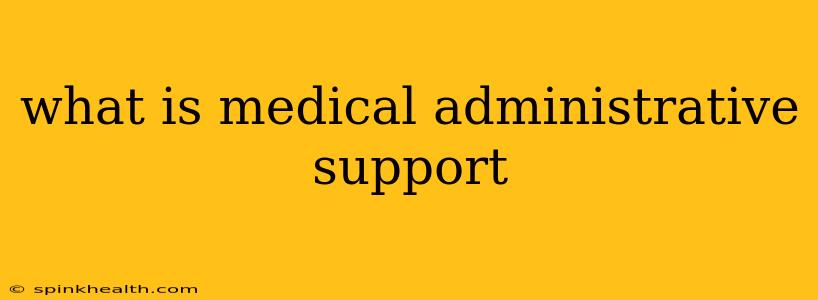What is Medical Administrative Support? A Day in the Life
Imagine a bustling doctor's office, a hospital's efficient admissions desk, or the smoothly-running administrative hub of a large healthcare system. Behind the scenes, ensuring everything runs like a well-oiled machine, are medical administrative support professionals. They're the unsung heroes, the organizational wizards who keep the healthcare world spinning. But what exactly is medical administrative support?
It's far more than just filing and answering phones (though those are certainly part of it!). Medical administrative support encompasses a wide range of tasks crucial to the effective delivery of healthcare. These professionals act as the vital link between patients, doctors, insurance companies, and other healthcare providers. Think of them as the central nervous system of a healthcare facility, coordinating information and ensuring seamless operations.
What Does a Medical Administrative Support Professional Do?
Let's follow a typical day in the life of Sarah, a medical administrative support professional at a busy family practice clinic:
Morning: Sarah starts her day by checking voicemails and emails, responding to patient inquiries regarding appointment scheduling, prescription refills, and test results. She then reviews the day's appointment schedule, ensuring all rooms are properly prepared and confirming patient insurance coverage. This often involves interacting with insurance providers to verify benefits and pre-authorize procedures.
Mid-day: Sarah assists the doctors with administrative tasks, such as preparing patient charts, entering medical data into electronic health records (EHRs), and managing medical billing. She might also handle correspondence with referral specialists, ensuring smooth transitions of care. She might even spend some time processing medical claims, battling insurance companies to get proper reimbursement for services.
Afternoon: Sarah might conduct patient check-ins and check-outs, handling co-pays and explaining billing procedures. She might also order medical supplies, maintain patient records (both physical and electronic), and assist with general office management tasks like scheduling meetings or maintaining office equipment.
Essentially, Sarah keeps everything running smoothly, allowing the doctors and nurses to focus on patient care. Her role is crucial, ensuring efficient workflow and accurate record-keeping.
What are the different types of Medical Administrative Support Jobs?
The field offers diverse career paths. Here are a few examples:
- Medical Office Assistant: Often the first point of contact for patients, managing appointments, answering phones, and handling patient check-in/check-out procedures.
- Medical Secretary: Provides high-level administrative support to physicians or medical teams, often managing complex schedules, correspondence, and medical records.
- Medical Billing and Coding Specialist: Focuses on the financial side of healthcare, processing claims, managing accounts receivable, and ensuring accurate billing practices. They need a solid grasp of medical terminology and insurance regulations.
- Health Information Technician: Responsible for maintaining the accuracy and confidentiality of patient health information, often working with electronic health records (EHRs) and complying with HIPAA regulations.
What skills are needed for a career in Medical Administrative Support?
Success in this field requires a blend of hard and soft skills:
- Strong organizational skills: Managing multiple tasks and prioritizing effectively is crucial.
- Excellent communication skills: Interacting with patients, doctors, and insurance companies requires clear and professional communication.
- Computer proficiency: Proficiency in EHR systems, word processing software, and spreadsheets is essential.
- Medical terminology: Understanding medical terms and abbreviations is vital for accurate record-keeping and communication.
- Knowledge of medical billing and insurance procedures: Particularly important for roles focused on the financial aspects of healthcare.
- Attention to detail: Accuracy is paramount in all aspects of medical administration.
- Problem-solving skills: Handling unexpected situations and finding solutions is a daily requirement.
How can I become a Medical Administrative Support Professional?
Entry-level positions often require a high school diploma or equivalent, but many employers prefer candidates with post-secondary education, such as a certificate or associate's degree in medical administration or a related field. On-the-job training is also common. Certifications, such as those offered by the American Association of Medical Assistants (AAMA), can enhance your credentials and career prospects.
Medical administrative support is a critical and rewarding career path for those who enjoy working in a fast-paced environment, helping people, and ensuring efficient operations within the healthcare system. If you are detail-oriented, organized, and possess strong communication skills, this could be the perfect career for you.

